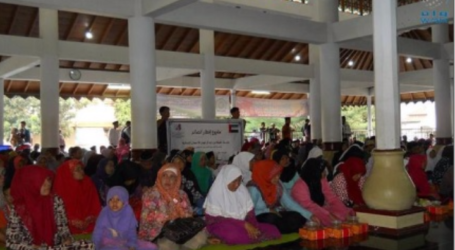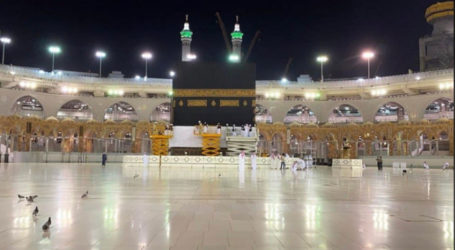EU CALLS ON ISRAEL TO DIMANTLE ALL ILLEGAL SETTLEMENTS
 Jakarta, 26 Dzul Hijja 1434/31 October 2013 (MINA) – The European Union (EU) has repeatedly stated that Israeli settlements are illegal under international law. It has also called on Israel to end all settlement activity, including natural growth, and to dismantle outposts erected since March 2001.
Jakarta, 26 Dzul Hijja 1434/31 October 2013 (MINA) – The European Union (EU) has repeatedly stated that Israeli settlements are illegal under international law. It has also called on Israel to end all settlement activity, including natural growth, and to dismantle outposts erected since March 2001.
The European Union (EU) Ambassador to ASEAN , H.E. Olof Skoog stated it in a press conference informing the visit of the High Representative of the Union for Foreign Affairs and Security Policy, Catherine Ashton in Jakarta, next November 4 th.
“After Wednesday’s announcements by the Israeli Prime Minister’s officer and Ministry of the Interior about renewed plans for Israeli settlements, I would like to recall that, on 27 September, the Middle East Quartet called on all parties to refrain from actions that undermine trust or prejudge final status issues,” said Skoog.
The EU deplores the recent settlement announcements. Any actions that could hamper or undermine the on-going peace negotiations must be avoided. Bold and decisive leadership is needed for these negotiations to succeed. The EU will continue to support this process,” added the ambassador.
The population in illegal West Bank settlements has grown twice. The figures show an increase of 7,700 illegal settlers in the occupied West Bank during the first six month of 2013 for a total settler population of 367,000.
This represents a 2.1 percent increase in six months compared to an annual population growth of two percent registered in Israel. The figures released by the Israli occupation interior ministry are likely to add to Palestinian misgivings about resuming talks with the Israelis.
The talks broke down three years ago over the settlement issue. The number of illegal settlers in West Bank outposts that could be dismantled as part of an eventual agreement between Israel and the Palestinians rose by 1.7 percent in the first half of the year.
The international community considers the establishment of Israeli settlements in the Israeli-occupied territories illegal under international law, but Israel occupation authority maintains that they are consistent with international law because it does not agree that the Fourth Geneva Convention applies to the territories occupied in the 1967 Six-Day War.
The United Nations Security Council, the United Nations General Assembly, the International Committee of the Red Cross, the International Court of Justice and the High Contracting Parties to the Convention have all affirmed that the Fourth Geneva Convention does apply.
Numerous UN resolutions have stated that the building and existence of Israeli settlements in the West Bank, East Jerusalem and the Golan Heights are a violation of international law, including UN Security Council resolutions in 1979 and 1980.
UN Security Council Resolution 446 refers to the Fourth Geneva Convention as the applicable international legal instrument, and calls upon Israel to desist from transferring its own population into the territories or changing their demographic makeup. The reconvened Conference of the High Contracting Parties to the Geneva Conventions has declared the settlements illegal as has the primary judicial organ of the UN, the International Court of Justice and the International Committee of the Red Cross.
Although all areas in question were captured by Israel in the 1967 Six-Day War, Israel has treated them in three different ways:
“East Jerusalem”—Jerusalem and its surroundings were envisioned as an international area under United Nations administration in the 1947 partition plan, which was accepted by Israel but rejected by all Arab nations. In 1948, Jordan captured and annexed the eastern half of Jerusalem, while Israel captured and annexed the west. Following the Six-Day War in 1967, Israel annexed the eastern part, together with several villages around it. In 1980 the Israeli Knesset passed the Jerusalem Law stating that “Jerusalem, complete and united, is the capital of Israel”.
The Israeli Golan Heights Law of 1981 applied Israel’s “laws, jurisdiction and administration” in the Golan Heights, which were captured from Syria in 1967. While the public viewed the move as an annexation, the law itself refrained from using the term officially.
The Gaza Strip and West Bank form part of the areas offered by the UN to a prospective Arab state of Palestine in the Partition Plan, which was rejected by the Arabs. From 1948 until 1967, The Gaza Strip was occupied by Egypt while the West Bank was annexed by Jordan. Together with the annexation of East Jerusalem mentioned above, Jordan’s annexation of the West Bank was not recognized internationally.
Since 1967, the West Bank has been under military occupation. Gaza was also occupied in 1967, but after Israel’s unilateral disengagement in 2005 the status has become disputed, with conflicting opinions on whether or not the occupation has ended. (T/P04/P01/E1)
Mi’raj News Agency (MINA)






